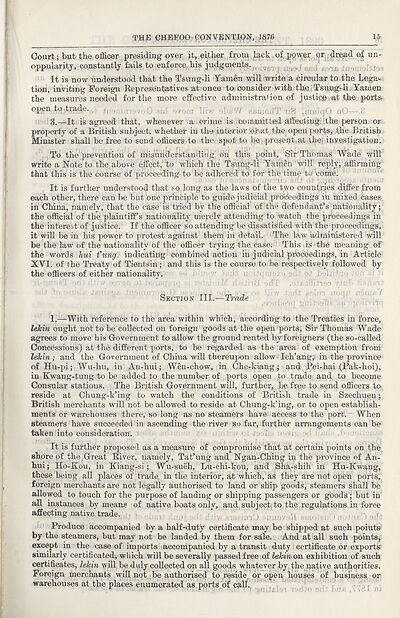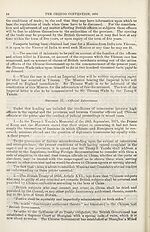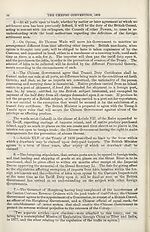1933
(67) Page 15
Download files
Complete book:
Individual page:
Thumbnail gallery: Grid view | List view

THE CHEFOO CONVENTION, 1876
If
Court; but the officer presiding over it,,either from lack of ppwer or . dread of un-
oppularity, constantly fails to enforce, his judgments. .'X;
It is now understood that the Tsuug-li Yainen will write a circular to the Lega*-
tion, inviting Foreign Representatives at once to consider with the Tsung-li Yamen
the measures needed for the more effective administration of justice at the, ports,
open to trade. , ,
3.—It is agreed that, whenever a crime is committed affecting; The person or
property of a British subject, whether in the interior dr at the open ports, the British
Minister shall be free to send officers.to the spot to he ; present,at the: investigation.
To the prevention of misunderstanding! oh this point, Sir Thomas Wade will
write a Note to the, above effect, to which the Tsuhg-li Yiurien will reply, affirming
that this is the course of proceeding, to he adhered td for thd time To'come.
It is further understood that solong as the laws of the two countries differ from
each other, there can be but one principle to guide judicial proceedings in mixed cases
in China, namely, that the case is tried by the official of the defendant’s nationality;
the official of the plaintiff’s nationality merely attending to watch the proceedings in
the interest of justice. If the officer so attending be dissatisfied w ith the proceedings,
it will be in his power to protest against them hi detail. The law administered will
be the law of the nationality of the officer trying the case; This is the meaning of
the words hui t’ung. indicating combined action in judicial proceedings, in Article
XYI. of the Treaty of Tientsin; and this is the course to be respectively followed by
the officers of either nationality.
Section III.—Trade
1.—With reference to the area within which, according to the Treaties in force,
lekin ought not to be collected on foreign goods at the open ports, Sir Thomas Wade
agrees to move his Government to allow the ground rented by foreigners (the so-called
Concessions) at the different ports, to be regarded as the area of exemption from
lekin; and the Government of China will thereupon allow Ich’ang,: in the province
of Hu-pi; Wu-hu, in An-hui; Wen-chow, in Che-kiang; and Pei-hai (Pak-hoi),
in Kwang-tung to be added to the number of ports open to trade and to become
Consular stations. The British Government will, further, be free to send officers to
reside at Chung-k’ing to watch the conditions of British trade in Szechuen;
British merchants will not he allowed to reside at Chung-k’ing, or to open establish¬
ments or warehouses there, so long as no steamers have access to the port. When
steamers have succeeded in ascending the river so far, further arrangements can be
taken into consideration.
It is further proposed as a measure of compromise that at certain points on the
shore of the Great River, namely, Tat’ung and Ngan-Ching in the province of An¬
hui; Ho-Kou, in Kiang-si; Wu-sueh, Lu-chi-kou, and Sha-shih in Hu-Kwang,
these being all places of trade, in the interior, at which, as they ate not open ports,
foreign merchants are not legally authorised to land or ship goods, steamers shall be
allowed to touch for the purpose of landing or shipping passengers or goods ; but in
all instances by means of native boats only, and subject, to the regulations in force
affecting native' trade.
Produce accompanied by a half-duty certificate may he shipped at such points
by the steamers, but may not be landed by them for sale. And at all such points,
except in the case of imports accompanied by a transit duty certificate or exports
similarly certificated, which will be severally passed free of lekin on exhibition of such
certificates, lekin will be duly collected on all goods whatever by the native authorities.
Foreign merchants will not be authorised to reside or open houses of business or
warehouses at the places enumerated as ports of call.
If
Court; but the officer presiding over it,,either from lack of ppwer or . dread of un-
oppularity, constantly fails to enforce, his judgments. .'X;
It is now understood that the Tsuug-li Yainen will write a circular to the Lega*-
tion, inviting Foreign Representatives at once to consider with the Tsung-li Yamen
the measures needed for the more effective administration of justice at the, ports,
open to trade. , ,
3.—It is agreed that, whenever a crime is committed affecting; The person or
property of a British subject, whether in the interior dr at the open ports, the British
Minister shall be free to send officers.to the spot to he ; present,at the: investigation.
To the prevention of misunderstanding! oh this point, Sir Thomas Wade will
write a Note to the, above effect, to which the Tsuhg-li Yiurien will reply, affirming
that this is the course of proceeding, to he adhered td for thd time To'come.
It is further understood that solong as the laws of the two countries differ from
each other, there can be but one principle to guide judicial proceedings in mixed cases
in China, namely, that the case is tried by the official of the defendant’s nationality;
the official of the plaintiff’s nationality merely attending to watch the proceedings in
the interest of justice. If the officer so attending be dissatisfied w ith the proceedings,
it will be in his power to protest against them hi detail. The law administered will
be the law of the nationality of the officer trying the case; This is the meaning of
the words hui t’ung. indicating combined action in judicial proceedings, in Article
XYI. of the Treaty of Tientsin; and this is the course to be respectively followed by
the officers of either nationality.
Section III.—Trade
1.—With reference to the area within which, according to the Treaties in force,
lekin ought not to be collected on foreign goods at the open ports, Sir Thomas Wade
agrees to move his Government to allow the ground rented by foreigners (the so-called
Concessions) at the different ports, to be regarded as the area of exemption from
lekin; and the Government of China will thereupon allow Ich’ang,: in the province
of Hu-pi; Wu-hu, in An-hui; Wen-chow, in Che-kiang; and Pei-hai (Pak-hoi),
in Kwang-tung to be added to the number of ports open to trade and to become
Consular stations. The British Government will, further, be free to send officers to
reside at Chung-k’ing to watch the conditions of British trade in Szechuen;
British merchants will not he allowed to reside at Chung-k’ing, or to open establish¬
ments or warehouses there, so long as no steamers have access to the port. When
steamers have succeeded in ascending the river so far, further arrangements can be
taken into consideration.
It is further proposed as a measure of compromise that at certain points on the
shore of the Great River, namely, Tat’ung and Ngan-Ching in the province of An¬
hui; Ho-Kou, in Kiang-si; Wu-sueh, Lu-chi-kou, and Sha-shih in Hu-Kwang,
these being all places of trade, in the interior, at which, as they ate not open ports,
foreign merchants are not legally authorised to land or ship goods, steamers shall be
allowed to touch for the purpose of landing or shipping passengers or goods ; but in
all instances by means of native boats only, and subject, to the regulations in force
affecting native' trade.
Produce accompanied by a half-duty certificate may he shipped at such points
by the steamers, but may not be landed by them for sale. And at all such points,
except in the case of imports accompanied by a transit duty certificate or exports
similarly certificated, which will be severally passed free of lekin on exhibition of such
certificates, lekin will be duly collected on all goods whatever by the native authorities.
Foreign merchants will not be authorised to reside or open houses of business or
warehouses at the places enumerated as ports of call.
Set display mode to:
![]() Universal Viewer |
Universal Viewer | ![]() Mirador |
Large image | Transcription
Mirador |
Large image | Transcription
Images and transcriptions on this page, including medium image downloads, may be used under the Creative Commons Attribution 4.0 International Licence unless otherwise stated. ![]()
| Asian directories and chronicles > 1933 > (67) Page 15 |
|---|
| Permanent URL | https://digital.nls.uk/203675182 |
|---|
| Attribution and copyright: |
|
|---|---|
| Description | Volumes from the Asian 'Directory and Chronicle' series covering 1917-1941, but missing 1919 and 1923. Compiled annually from a multiplicity of local sources and research. They provide listings of each country's active corporations, foreign residents and government agencies of all nationalities for that year, together with their addresses. Content includes: various treaties; coverage of conflicts; currencies and taxes; consular fees; weights and measures; public holidays; festivals and traditions. A source of information for both Western states and communities of foreigners living in Asia. Published by Hongkong Daily Press. |
|---|---|
| Shelfmark | H3.86.1303 |
| Additional NLS resources: |

